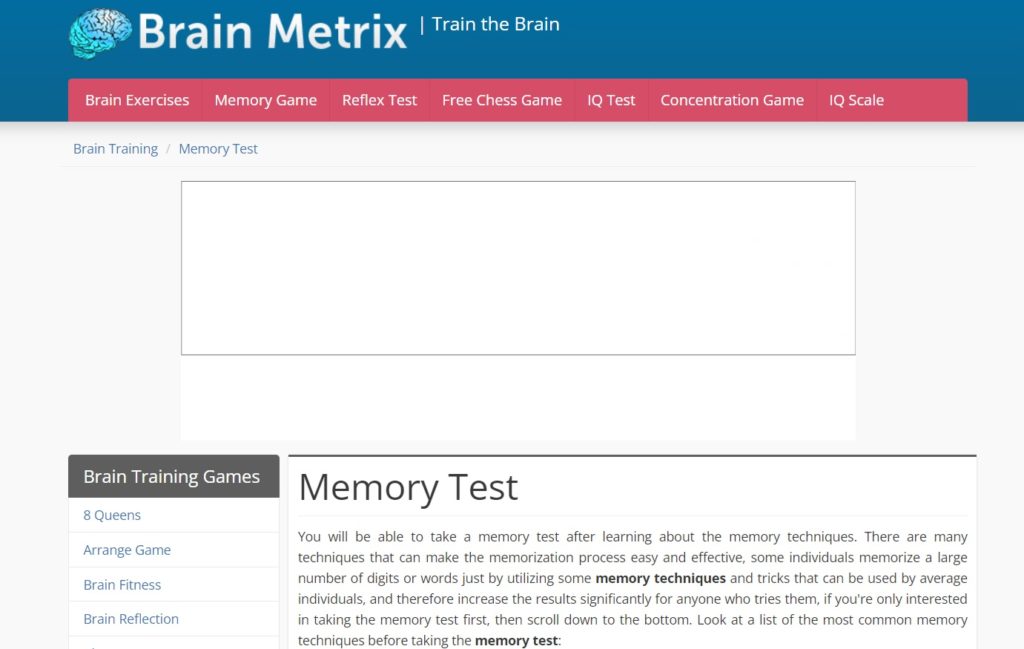Interested to know if your memory is working as it should?
While playing memory games can increase your cognitive strength, taking a memory test is a good way to gauge the status of your memory and overall brain health.
For today’s post, we’ve rounded up the best tests to assess your memory and help you get a glimpse into your overall brain health.
The Importance of Having a Good Memory
These days, many of us rely on search engines for the information we need. But even with modern technology available to us, a good memory is still important.
Here are some reasons why having a good memory is essential:
Things You Can Do to Strengthen Your Memory
Memory often deteriorates with age. In addition, it can be negatively affected by factors such as lack of sleep, injury, stress, fatigue, certain illnesses, substance abuse, and nutrient/vitamin deficiencies.
Here are some specific things you can do to strengthen your memory:
The Importance of Memory Screening/Testing
Getting your memory assessed is one of the best ways to learn about the health of your brain and its cognitive functions. If the test reveals an issue, the proper treatment can be started early.
The following tests are assessments to help flag possible memory issues. However, these are not designed for diagnostic purposes. If necessary, consult a qualified health professional for the correct diagnosis and/or treatment.
Many of the tests have to be completed online, while others are apps that can be downloaded for iOS and Android platforms.
Let’s check them out.
1. Memory Health Check
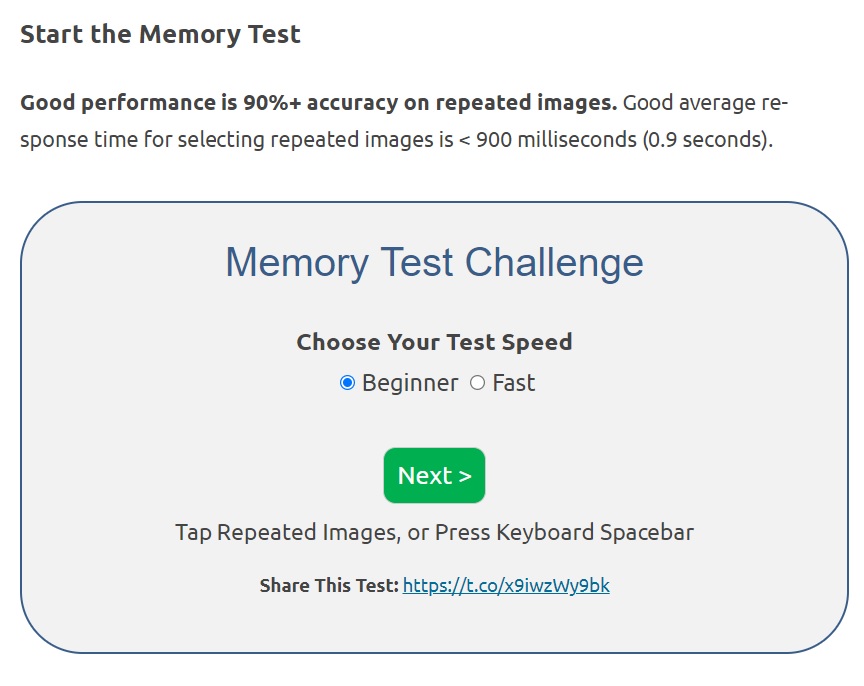
Cost: Free
Best for: Assessing the health of your short-term memory
Website: Memory Health Check
This test assesses the performance of your short-term memory. It uses a series of images that flash across your screen.
There are two speed modes for displaying the images: Beginner and Fast.
You need to determine if an image has been repeated, which you indicate by pressing your keyboard’s space bar or touching it on the screen.
Your score is shown at the end of the test.
The benchmark “score” for a good memory is 90% accuracy with 0.9 seconds response time.
2. Total Brain
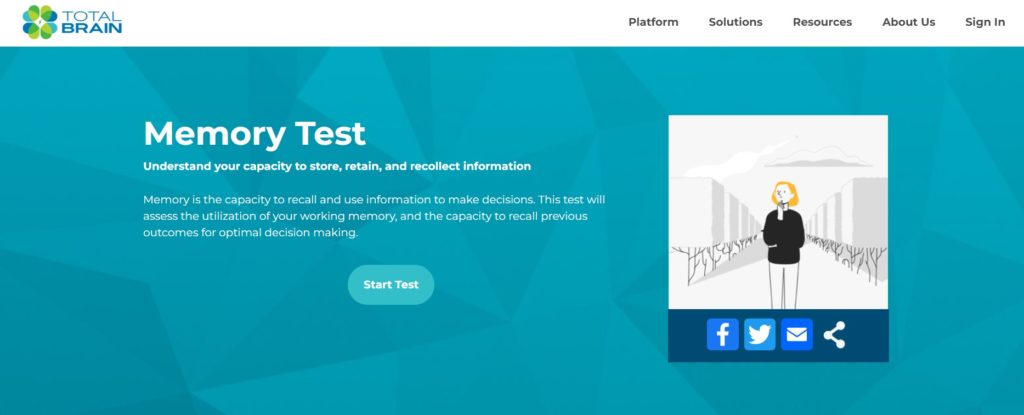
Cost: Free
Best for: Assessing the capacity of your working memory
Website: Total Brain
Your working memory is your ability to hold information and use it for a task. For example, you can comfortably recall all grocery items you need without depending on a shopping list. Another example is when you can memorize a phone number without having to write it down.
This test assesses your working memory. It shows you a series of numbers that you must key in on a numeric pad in the correct sequence. Your score (in percent) is shown at the end of the test.
The average time to take the test is five minutes.
A general interpretation of the scores is given on the webpage.
3. MemTrax
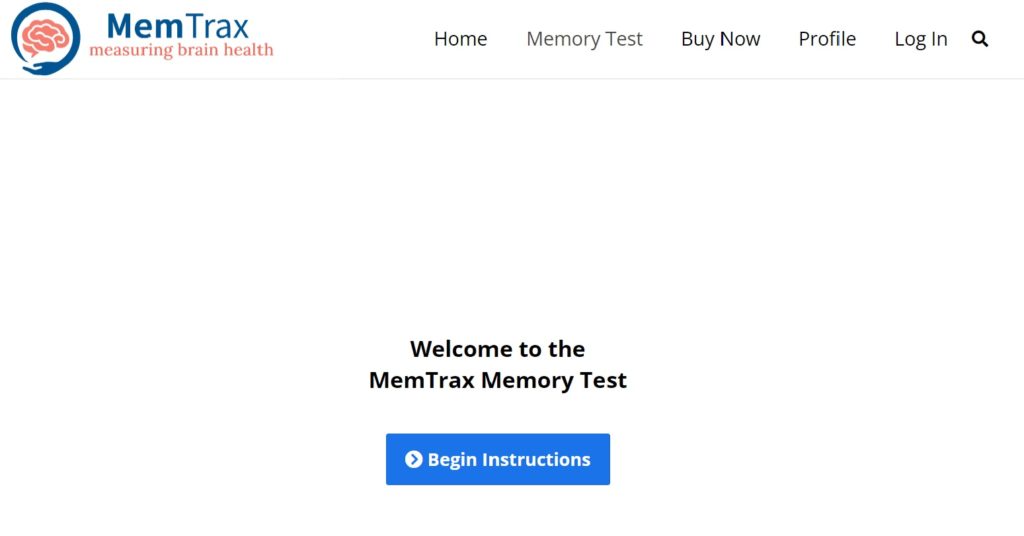
Cost: Free for the first test; $2.99/month; $24.99/year
Best for: Assessing your memory function
Website: MemTrax
Like most memory tests, this one assesses your memory function, one of the five cognitive domains of the brain (the others being attention, perception, executive functions, and coordination).
The test displays a series of images, and you must indicate by pressing your keyboard spacebar if an image is repeated. Your score is displayed immediately after you finish the test, along with some words of encouragement.
The first test in MemTrax is free. When you subscribe, you can access other tests and save the score from your first test. This will be used as your baseline score for comparison with other tests you take in the future.
4. Cognitive Assessment Battery for Memory
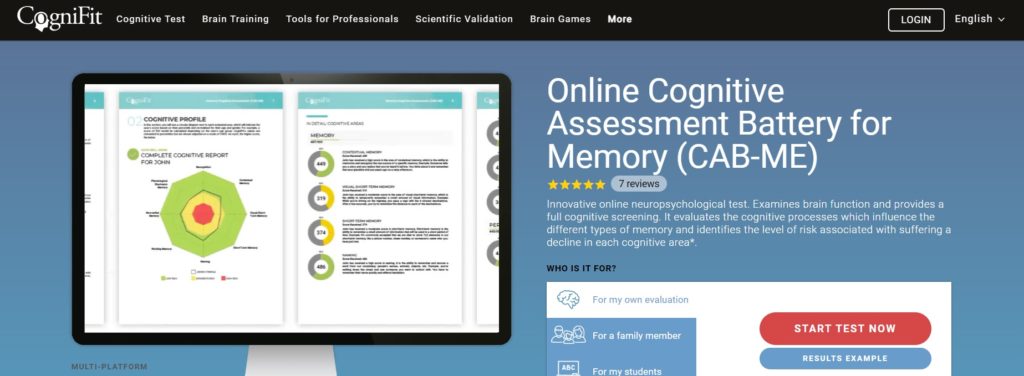
Cost: Starts at $49.99
Best for: Assessment of all brain functions, with focus on memory
Website: CogniFit
iOS Link: Available in the Apple App Store
Android Link: Available in the Google Play Store
This science-backed test is a complete screening of your cognitive functions, with a focus on memory. It allows you to detect if you are at risk for memory loss or if there are other memory issues that need to be addressed.
The test takes between 15 and 20 minutes, with results automatically provided once you’re done.
These results are presented in a report format, with three main sections providing in-depth information regarding:
The conclusion section provides recommendations of what you can do to improve cognitive areas that need to be strengthened.
5. Practical Psychology
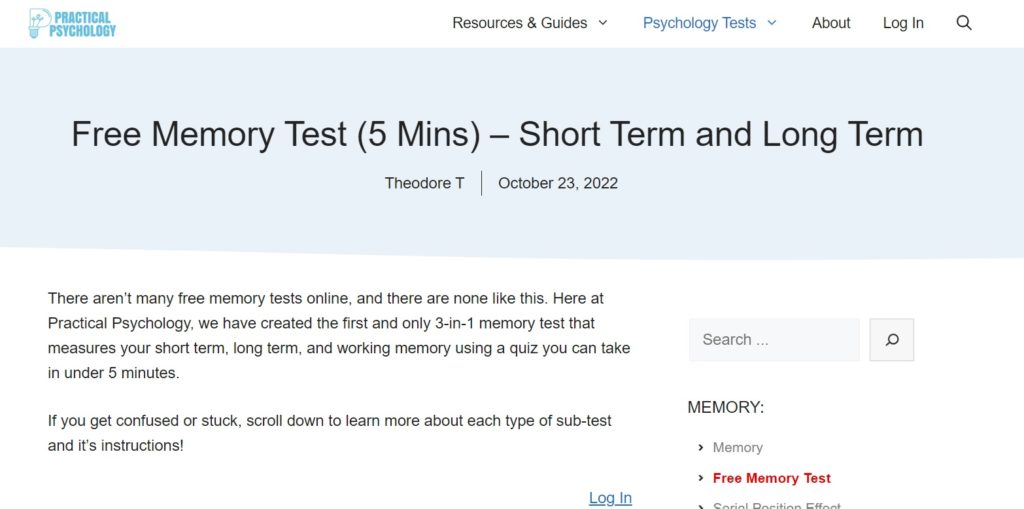
Cost: Free
Best for: Measuring the performance of different types of memory, including working, long-term, and short-term
Website: Practical Psychology
In the short-term memory section, users are shown multi-digit numbers and then have to recall them by typing the correct sequence. The test increases in difficulty as it progresses.
Meanwhile, in testing for long-term memory, users are asked to remember three types of animals that they need to identify in a chart with images of different animals.
Finally, the working memory test uses three variations to assess the user’s ability to hold information (consisting of letters, numbers, and items) and use it in certain tasks.
This test takes an average of five minutes to finish. The total score is presented at the end.
6. Human Benchmark
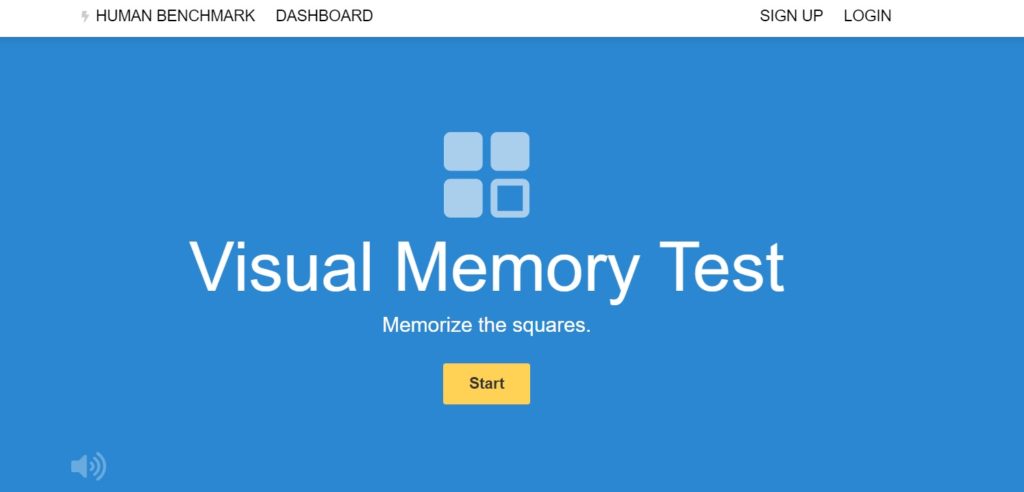
Cost: Free
Best for: Testing your visual memory
Website: Human Benchmark
This set of tests is designed to test your cognitive abilities. The section for visual memory requires you to remember patterns of white tiles on a board and recreate them when the board resets.
The patterns get more complex with each level.
This is a gamified test and you are given three lives. Three mistakes in recreating the tile pattern makes you lose a life.
Your score is then measured against all other users who have done this test.
7. MindCrowd
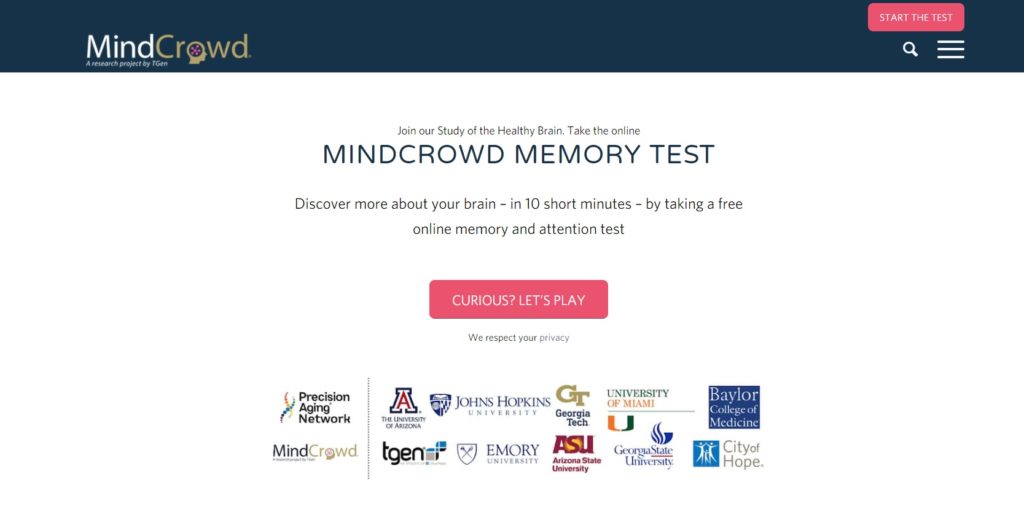
Cost: Free
Best for: Testing your attention and memory
Website: MindCrowd
MindCrowd is a research effort by TGen that aims to find ways to prevent memory loss and discover preventive measures for degenerative diseases of the brain, such as dementia.
This test is part of the data gathered for the research. After agreeing to the terms of this test, you are taken to a page where you fill out information about yourself.
You are then directed to a series of tests that assess your attention and memory skills.
The test runs for an average of 10 minutes. After filling out additional information, you are then taken to your results.
For the purpose of comparison, your results are shown in a chart alongside research participants from the same demographic as you, as well as a chart showing the overall average for all of the participants of this research.
8. BrainTest
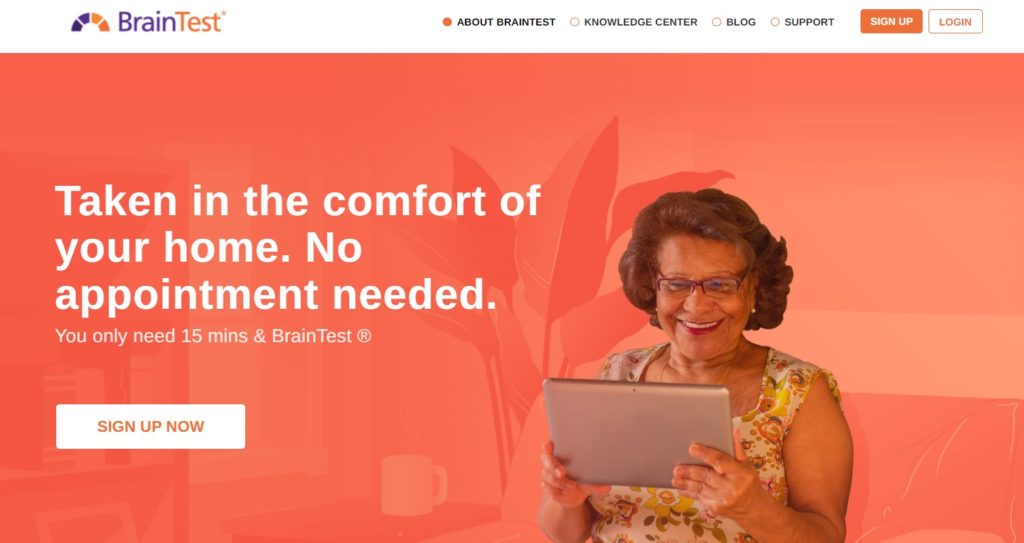
Cost: Free, with in-app purchases starting at $24.99
Best for: Detecting early signs of memory impairments
Website: BrainTest
iOS Link: Available in the Apple App Store
Android Link: Available in the Google Play Store
This test was developed to detect early signs of cognitive and memory issues. It is based on the Self-Administered Gerocognitive Examination developed by OSU’s Wexner Medical Center. It takes 15 minutes to complete and the results are then available after three days.
The results of the assessment are analyzed by certified doctors. You’ll receive a printable report, as well as a video of a doctor interpreting your results.
If you are concerned that you’re having memory problems or would like to help a family member or friend, this test is useful for assessment.
9. Psychology Today
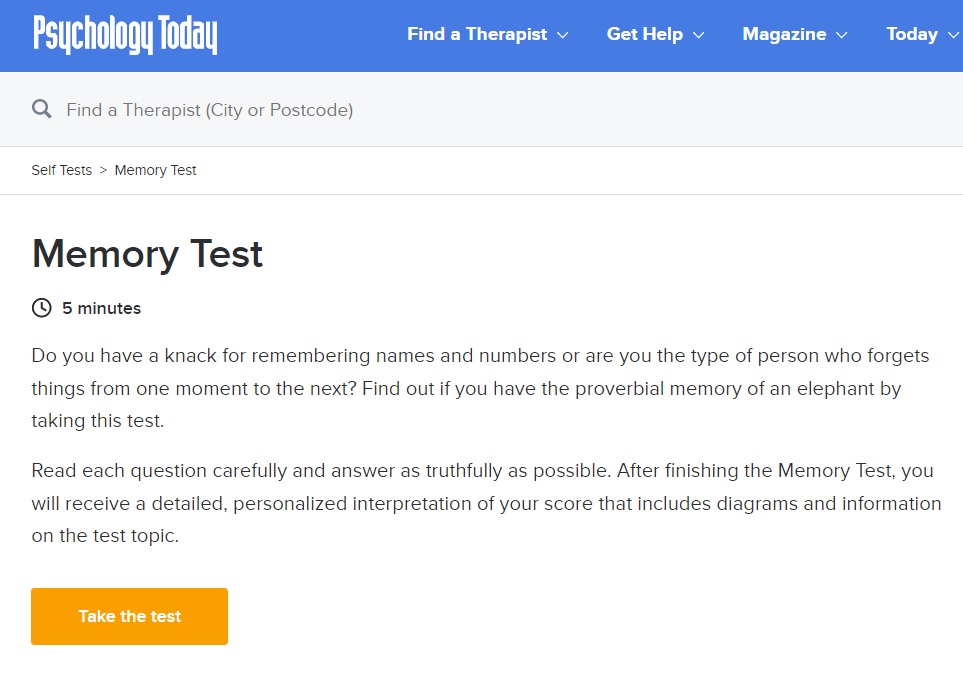
Cost: Free
Best for: Determining, in less than five minutes, if you have a strong memory
Website: Psychology Today
If you need a quick test to assess the strength of your memory, here’s a great option from Psychology Today.
In this test, you are asked to rate your agreement on seven anecdotal statements regarding your ability to recall information.
The test can be taken in five minutes, with the results provided immediately after you’re done. You will receive a personalized interpretation of your score, as well as recommendations for strengthening/improving your memory.
10. Alzheimer’s Research & Prevention Foundation’s Memory Quiz
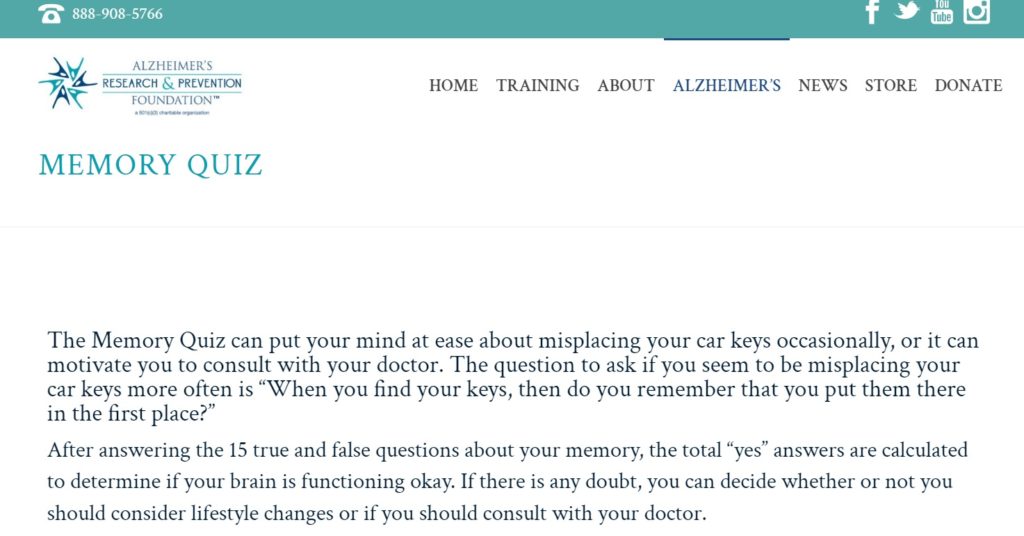
Cost: Free
Best for: Finding out if your brain is functioning well
Website: Alzheimer’s Research & Prevention Foundation
This quiz helps assess if you’re having memory problems caused by underlying health conditions or if the incidents of forgetfulness you experience are the result of other factors, such as stress or fatigue.
The 15 questions in this quiz are answerable by “true” or “false.” You then tally your score and find the corresponding interpretation provided at the bottom of the quiz.
These interpretations come with recommendations for lifestyle changes and suggestions for when to visit a doctor for appropriate diagnosis and treatment.
11. Brain Metrix
Cost: Free
Best for: Testing your short-term memory and attention
Website: Brain Metrix
This no-frills test lets you check the strength of your short-term memory and attention.
In this gamified test, you need to choose the same rectangles highlighted by the computer. You move up one level each time you succeed in recreating the computer’s pattern.
The game becomes more difficult as you go to higher levels. If you make an error, the entire test goes back to level one.
Final Thoughts on Memory Tests
Although memory usually deteriorates as a person grows older, there are ways to slow down memory loss, such as consuming foods that improve brain function and adopting a less stressful lifestyle.
Periodically taking a memory test ensures that you are aware of the status of your brain’s functions.
More importantly, it helps detect early signs of memory problems so that the appropriate course of action or treatment can be administered as soon as possible.
Hopefully you found today’s article useful in helping you decide on the best memory test to try.
Meanwhile, there are a number of things you can do to improve your memory, including memory games for kids and adults. Furthermore, there are habits you can build to help reduce brain fog so your thoughts have greater clarity.
Finally, if you want to take your goal-setting efforts to the next level, check out this FREE printable worksheet and a step-by-step process that will help you set effective SMART goals.



